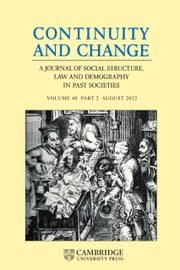Article contents
Statistics and ‘sufficiency’: toward an intellectual history of Russia's rural crisis
Published online by Cambridge University Press: 31 July 2002
Abstract
The article examines the impact of the ‘rise of statistical thinking’ and statistical measurement on elite perceptions of the condition of the Russian Empire's post-emancipation peasant economy. Using archival and published sources, it argues that the increased use of statistical measurement did much to concretize in numerical (‘objective’) terms the idea of rural crisis. In particular, the combination of traditional paternalistic concerns about the sufficiency of peasant resources and the use of cadastre measurement yielded an image of the peasant household economy in which the value (the income-producing capabilities) of post-emancipation peasant allotments nearly always fell short of subsistence requirements and tax/payment obligations. Thus, because of how observers measured peasant well-being, it appeared as if peasants had been over-changed for their post-emancipation land allotments and were doomed to exist in a permanent state of crisis.
- Type
- Research Article
- Information
- Copyright
- © 2002 Cambridge University Press
- 6
- Cited by


